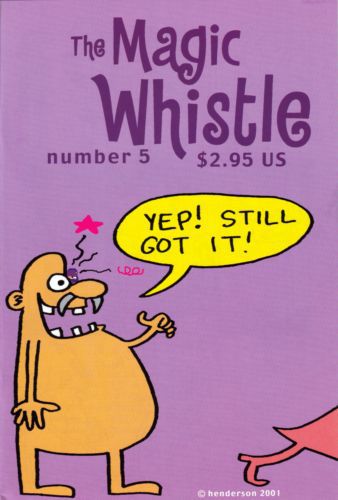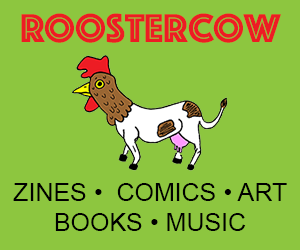

Sam Henderson, cartoonist Interview by Chris Auman Published in RW #14, 2000 
If you don't laugh out loud at one of Sam Henderson's comic strips then you probably have bananas stuck in your eye sockets. If that's the case, I strongly recommend that you get 'em outta there 'cause with Sam's style of cocktail napkin cartooning, hilarious, if not downright absurd situations, and head slaps for punch lines, you're missing a good chuckle at the expense of such characters as Dirty Danny, Punctuation Duck and Vaudeville Gorilla. RW: So, you think you're pretty funny, huh? Don't you? You think you're pretty funny? A real funny guy... (long pause) SH: What? Oh, sorry, I was waiting for you to add, "But looks aren't everything."I still have a Pavlovian response from everyone saying that all the time in junior high. I just do what I do and lucked out with other people happening to find it funny too. RW: When did you first discover that humor can be funny? SH: I think that I, like everyone else, was born thinking that. It's when we grow up that peer pressure dictates what we find funny and we lose our senses of humor. We all flung shit at the wall or on our parents and we laughed instinctively, not because of any preconceived notion about what should make us laugh. I want to make people laugh, but my only rule is to be sure I find it funny myself. RW: That's a good rule.
SH: I also might have realized that humor can be funny from Cracked (magazine). After my previous book, Humor Can Be Funny, came out, I found an old Cracked I hadn't looked at in over fifteen years that had that same slogan as the tag line. RW: Do people buy your comics, read your comics, enjoy your comics, and are better people because they buy your comics, read your comics, and enjoy your comics? SH: I can't say one way or the other. All I ask is that people do so for the right reasons. I forget who it was, but I remember reading how some band stopped doing a song about rape because some frat boy fans didn't get that it was an anti-rape song. Steve Martin said he quit doing stand-up because his audiences were laughing, not because of his material, but because of his presence. RW: I think I've heard that. SH: There's a difference between using a premise in a joke and using it as a joke. If someone reads a comic of mine and laughs at the themes and not the situations surrounding it, they don't get it and are not better. But when they know what I'm doing I respect them more. RW: So, what is art anyway? What does it mean to "create art?"What do people mean by that? Why "create art?"Why is it important to "create art?"(It may be useful to our readers to note that I am doing the little "qoutey"things with my fingers—you know, curling them up to represent quotes on paper.)  SH: I hate to talk about art because, even though I analyze things myself, I prefer to be entertained. While I do believe work in any medium is usually better when done by one individual, that doesn't make anything that happens to be by one individual better than anything done by a committee or corporation. Most independent film, comics, or anything else are just as formulaic and derivative as what the mainstream puts out. Anybody who considers themselves an "artist"isn't one. No great artist sat down and said, "I'm going to create a great work of art and go down in history."We could use fewer people with artistic aspirations and more teachers, cops, doctors, etc. Don't ask me how to recruit anybody in those fields, I'm just an artist. RW: You know, you can take feces—dung from an elephant or, I guess a household pet—and smear it around on a simple charcoal rendering of a religious figure and that would be art? SH: That's up to public opinion. It doesn't impress me and both the artist and critic are wrong;The artist is a pretentious asshole for thinking they're breaking some kind of boundaries—"Oh, look what I did! I'm shocking!"Those who cry blasphemy can't really have much confidence in their beliefs and only encourage pretentious works of art. RW: But would that be considered to be low art or high art? SH: Depends on whether it's displayed close to the floor or to the ceiling. RW: Yesss I see, but let's say you simply draw a man whose ass happens to be absent—it's missing and the man can not find his ass and he's looking for his missing ass—maybe he finds it, maybe he doesn't. Is this low art of high art? SH: Like I'm trying to say, art is in the eye of the beholder. I consider myself an entertainer before I consider myself an artist. I know the art world but if someone wanted to pay me $10,000 for one of my originals and dozens of others followed their lead, I'd be an idiot to turn them down. RW: A real thin line there. So now that we know where, or on which side of the line, Sam Henderson stands, what is your philosophy of comedy? SH: As I said, I do what I do and am fortunate that others like it. If there's any philosophy it's that a sense of humor and an appreciation of humor are two entirely different things. I've told people they have no sense of humor and they say something like, "Yes, I do, I like 'The Simpsons'."That's not a sense of humor it's "knowing funny."I've also heard, "I have a sense of humor, it's just that it's not funny."Which proves my point, a sense of humor has nothing to do with value judgments, it's about recognizing and accepting a joke as one. RW:"Unimaginative, pointless, and devoid of any humor."This has been said about your comic Magic Whistle hasn't it? They nailed it on the head didn't they? SH: The quote you mentioned is from Comics Buyers Guide, which is basically an industry paper for superhero comics and fans who have limited standards of what comics have to be. The only real negative reactions I ever get is from comics fans. People in the real world don't tell me I need to work on my anatomy or learn to draw folds of clothing. It's only a few people in comics who don't know what cartooning means. RW: It's like your reform bill on "Humorology"(Magic Whistle, vol 2, no. 1). There's nothing new under the sun. Yesterday's observations are tomorrow's cliches. (Jerry Seinfeld voice) "What's the deal with the titmouse? It's not a mouse and it doesn't have tits?"South Park out-Beavised Beavis and Butthead. Where does the cycle end? Our generation never had a Vietnam but we've seen Marilyn Manson's ass? Where do you go after that? SH: Material created solely for the purpose of offending usually never works. Beavis &Butt-head did because everybody's met people like them. South Park is hit and miss. Those guys know how to execute what they're doing but need to get over the idea of getting things past censors just because they can. There are plenty of ways to continue being creative and old doesn't necessarily have to mean tired. RW: Is Magic Whistle the future? Is it where we've arrived at the end of the 20th Century when things have gone to such extremes that they're absurd? SH: I've never claimed to be an innovator in comics or humor, I just take advantage of what's already been created and try to do a new take on it. The idea that society is currently at it's peak of absurdity has been the belief in any era and always will be. The only way things could ever get less extreme is to erase any evidence or memory of what's happened. RW: I think they're working on that actually. When did you first realize that you were going to throw your life away and draw the little cartoons? SH: Probably as long as I've been able to write. At one point I realized there was no turning back and I'd created my own Catch-22. As a kid I tried to fit in but couldn't because of all the time I spent drawing cartoons, then I went back to drawing cartoons because I couldn't fit in. RW: We're your friends and family supportive of this? SH: My parents work in the media so they have an idea of what I do and what my career's like even though they don't quite understand the philosophy behind my work. My father wanted to be a cartoonist as a kid but went on to other things. When I was in school they wanted me to get good grades before working on my comics and I would always say grades didn't matter because I knew what I wanted to do. As an adult, they admitted I had a point but they couldn't have known I'd turn out OK. My friends were supportive because I chose to only have friends that were. RW: That's a good idea. So, that Y2K thing was really overblown wasn't it? SH: Yep. If anybody wants to buy 300 candles and 1,000 cans of okra dirt cheap . . . RW: I've enjoyed our time together but you haven't even touched your crab cakes, was it something I said? SH: Now you tell me. I thought they were yours. RW: I am sooo embarrassed, they are mine. Any closing arguments? SH: Yes, to all you reading this interview;whatever it is you're doing next . . . don't. 
Read more interviews with Comics Artists: Peter Bagge
Sam Henderson
Johnny Ryan
Gary Panter
Terry Laban
Dan Clowes |